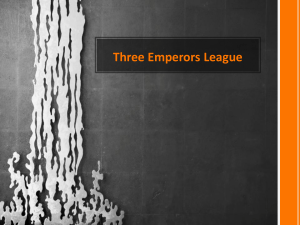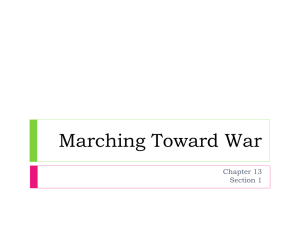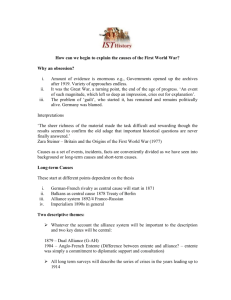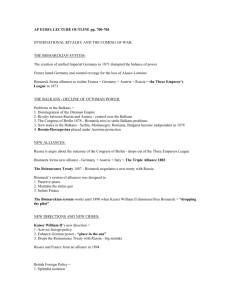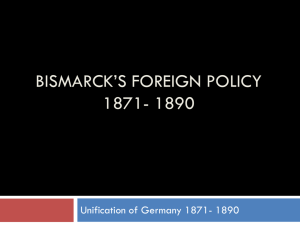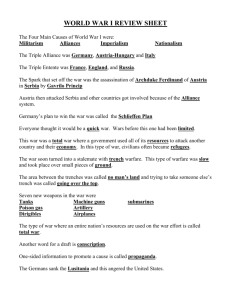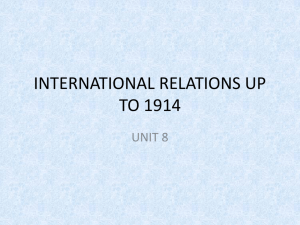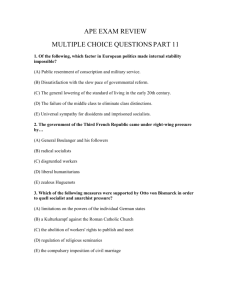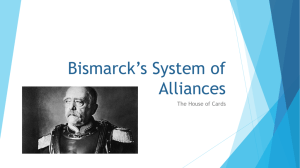Colton Mccullah Period 4
advertisement
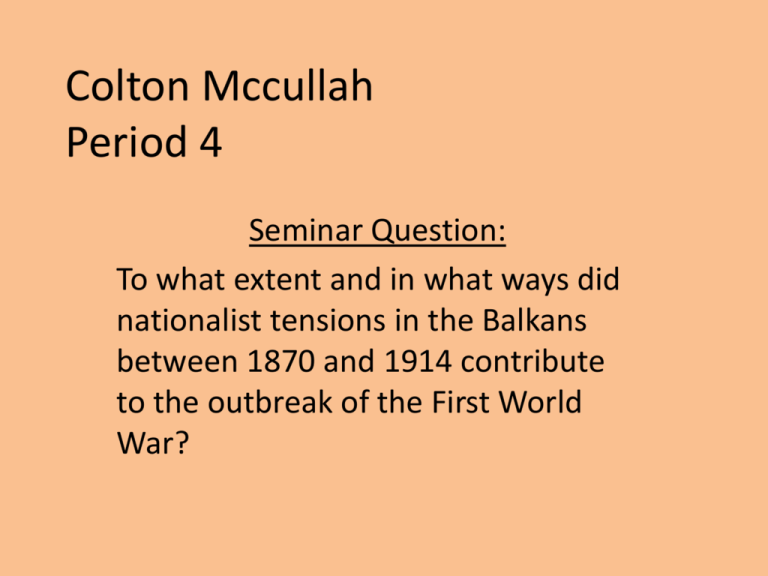
Colton Mccullah Period 4 Seminar Question: To what extent and in what ways did nationalist tensions in the Balkans between 1870 and 1914 contribute to the outbreak of the First World War? Background History: – In 1871, Bismarck had successfully established Prussia-Germany as the strongest and most powerful nation in Europe. As the dominant nation, Germany had no desire to expand their nation and only wished for peace. – After France’s defeat in the Franco-Prussian War, France was forced to pay an enormous sum of money to cover the expense of the war, and give up their territory of Alsace-Lorraine. Striving For Peace Bismarck’s Two Concerns: Bismarck’s Plan to keep peace: 1. • The Three Emperor’s League of 1873 was an alliance of Germany, Russia and Austria made by Bismarck in hope to keep the three nations in good relations. 2. His first concern was to keep France isolated and without any military allies. His second concern was that Germany would be dragged into a war between AustriaHungary and Russia.(Austria-Hungary and Russia had many conflicts including their interests in the Balkans.) Change in Alliances – In 1877 and ’78, Russia fought and won war against the Ottoman Empire, in the Balkans. This disrupted the deal made to leave the Balkans alone and thus infuriated Austria. Bismarck tried to play peacemaker, but in 1878 in the Congress of Berlin, he upset German nationalists which forced Bismarck to break this three-way alliance, and build a new military alliance with only Austria. (Austrian-German Alliance lasted from 1879 until the end of WW1 in 1918) – Then in 1882, the Triple Alliance was formed…Italy had tension with France witch led them to form an alliance with both Germany and Austria. ( Triple Alliance was from 1882 until 1915) Continuation of the Alliances • In 1881, Bismarck created a secret alliance with Germany, Russia, and Austria which lasted until 1887 when Russia broke off this Alliance of the Three Emperors due to new tensions in the Balkans. • Bismarck’s defensive alliances proved to keep peace with Germany, Austria-Hungary, and Russia for nearly a whole generation. • In 1890, Bismarck was dismissed and Emperor William the Second took command. WAR IN THE BALKINS: 1st Balkin War-1912 Balkan nationalism was on the rise with Serbia leading the way. Serbia joined Greece and Bulgaria in order to successfully attack the Ottoman Empire. 2nd Balkin War-1913 The Serbs, along with those of Greece and Bulgaria, victoriously defeated the Ottoman Empire. But in a dispute over the earnings of the war between Serbia and Bulgaria, the 2nd war had begun. Centuries later, nationalism had destroyed the Ottoman Empire entirely. 3rd Balkin War-1914 The Serbs assasinated the heir to the AustroHungarian throne, and his wife. This provoked Austria to punish Serbia once and for all. After trying to force Serbia to cede control of its state, the Austrian forces declared war on June 28, 1914. World War 1 • On July 29, Russia declared general war on every one and ordered full mobilization of its armies. • After Belgium refused to let German armies pass through its territory and advance on to fight Russsia, Germany attacked and began an all out invasion of France. • Then, Great Britain joined in on France’s side and declared war on Germany the very next day. This marked the beginning of World War 1. NATIONALISM AFFECTS WW1 • Nationalism was at the heart of the three Balkan Wars, resulting in the first World War in 1914. • Nationalism also led to the Spiraling Arms Race: which was a fight to prove naval superiority between Germany and Britain that poisoned the relations between the two countries.

